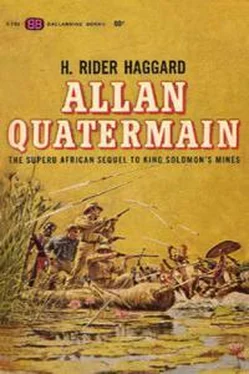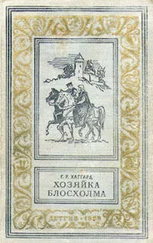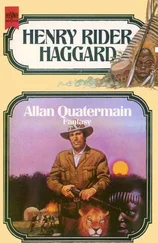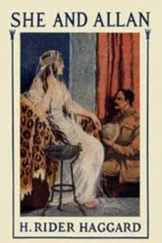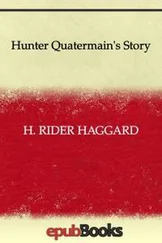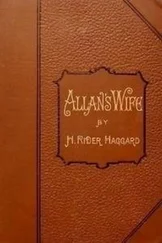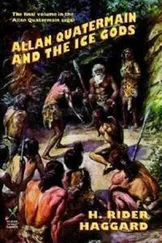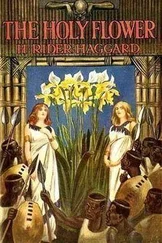On he came, taking him at his word, and drave the big spear with such force at Umslopogaas that it sunk right through the tough shield and pierced him in the neck. The Zulu cast down the transfixed shield, and that moment was Agon's last, for before he could free his spear and strike again, with a shout of ' There's for thee, Rain–maker! ' Umslopogaas gripped Inkosi–kaas with both hands and whirled on high and drave her right on to his venerable head, so that Agon rolled down dead among the corpses of his fellow–murderers, and there was an end to him and his plots altogether. And even as he fell, a great cry rose from the foot of the stair, and looking out through the portion of the doorway that was yet unclosed, we saw armed men rushing up to the rescue, and called an answer to their shouts. Then the would–be murderers who yet remained on the stairway, and amongst whom I saw several priests, turned to fly, but, having nowhere to go, were butchered as they fled. Only one man stayed, and he was the great lord Nasta, Nyleptha's suitor, and the father of the plot. For a moment the black–bearded Nasta stood with bowed face leaning on his long sword as though in despair, and then, with a dreadful shout, he too rushed up at the Zulu, and, swinging the glittering sword around his head, dealt him such a mighty blow beneath his guard, that the keen steel of the heavy blade bit right through the chain armour and deep into Umslopogaas' side, for a moment paralysing him and causing him to drop his axe.
Raising the sword again, Nasta sprang forward to make an end of him, but little he knew his foe. With a shake and a yell of fury, the Zulu gathered himself together and sprang straight at Nasta's throat, as I have sometimes seen a wounded lion spring. He struck him full as his foot was on the topmost stair, and his long arms closing round him like iron bands, down they rolled together struggling furiously. Nasta was a strong man and a desperate, but he could not match the strongest man in Zululand, sore wounded though he was, whose strength was as the strength of a bull. In a minute the end came. I saw old Umslopogaas stagger to his feet—ay, and saw him by a single gigantic effort swing up the struggling Nasta and with a shout of triumph hurl him straight over the parapet of the bridge, to be crushed to powder on the rocks two hundred feet below.
The succour which had been summoned by the girl who had passed down the stair before the assassins passed up was at hand, and the loud shouts which reached us from the outer gates told us that the town was also aroused, and the men awakened by the women were calling to be admitted. Some of Nyleptha's brave ladies, who in their night–shifts and with their long hair streaming down their backs, just as they had been aroused from rest, went off to admit them at the side entrance, whilst others, assisted by the rescuing party outside, pushed and pulled down the marble blocks they had placed there with so much labour.
Soon the wall was down again, and through the doorway, followed by a crowd of rescuers, staggered old Umslopogaas, an awful and, in a way, a glorious figure. The man was a mass of wounds, and a glance at his wild eye told me that he was dying. The 'keshla' gum–ring upon his head was severed in two places by sword–cuts, one just over the curious hole in his skull, and the blood poured down his face from the gashes. Also on the right side of his neck was a stab from a spear, inflicted by Agon; there was a deep cut on his left arm just below where the mail shirt–sleeve stopped, and on the right side of his body the armour was severed by a gash six inches long, where Nasta's mighty sword had bitten through it and deep into its wearer's vitals.
On, axe in hand, he staggered, that dreadful–looking, splendid savage, and the ladies forgot to turn faint at the scene of blood, and cheered him, as well they might, but he never stayed or heeded. With outstretched arms and tottering gait he pursued his way, followed by us all along the broad shell–strewn walk that ran through the courtyard, past the spot where the blocks of marble lay, through the round arched doorway and the thick curtains that hung within it, down the short passage and into the great hall, which was now filling with hastily–armed men, who poured through the side entrance. Straight up the hall he went, leaving behind him a track of blood on the marble pavement, till at last he reached the sacred stone, which stood in the centre of it, and here his strength seemed to fail him, for he stopped and leaned upon his axe. Then suddenly he lifted up his voice and cried aloud—
'I die, I die—but it was a kingly fray. Where are they who came up the great stair? I see them not. Art thou there, Macumazahn, or art thou gone before to wait for me in the dark whither I go? The blood blinds me—the place turns round—I hear the voice of waters.'
Next, as though a new thought had struck him, he lifted the red axe and kissed the blade.
'Farewell, Inkosi–kaas,' he cried. 'Nay, nay, we will go together; we cannot part, thou and I. We have lived too long one with another, thou and I.
'One more stroke, only one! A good stroke! a straight stroke! a strong stroke!' and, drawing himself to his full height, with a wild heart–shaking shout, he with both hands began to whirl the axe round his head till it looked like a circle of flaming steel. Then, suddenly, with awful force he brought it down straight on to the crown of the mass of sacred stone. A shower of sparks flew up, and such was the almost superhuman strength of the blow, that the massive marble split with a rending sound into a score of pieces, whilst of Inkosi–kaas there remained but some fragments of steel and a fibrous rope of shattered horn that had been the handle. Down with a crash on to the pavement fell the fragments of the holy stone, and down with a crash on to them, still grasping the knob of Inkosi–kaas, fell the brave old Zulu— dead .
And thus the hero died.
A gasp of wonder and astonishment rose from all those who witnessed the extraordinary sight, and then somebody cried, ' The prophecy! the prophecy! He has shattered the sacred stone!' and at once a murmuring arose.
'Ay,' said Nyleptha, with that quick wit which distinguishes her. 'Ay, my people, he has shattered the stone, and behold the prophecy is fulfilled, for a stranger king rules in Zu–Vendis. Incubu, my lord, hath beat Sorais back, and I fear her no more, and to him who hath saved the Crown it shall surely be. And this man,' she said, turning to me and laying her hand upon my shoulder, 'wot ye that, though wounded in the fight of yesterday, he rode with that old warrior who lies there, one hundred miles 'twixt sun set and rise to save me from the plots of cruel men. Ay, and he has saved me, by a very little, and therefore because of the deeds that they have done—deeds of glory such as our history cannot show the like—therefore I say that the name of Macumazahn and the name of dead Umslopogaas, ay, and the name of Kara, my servant, who aided him to hold the stair, shall be blazoned in letters of gold above my throne, and shall be glorious for ever while the land endures. I, the Queen, have said it.'
This spirited speech was met with loud cheering, and I said that after all we had only done our duty, as it is the fashion of both Englishmen and Zulus to do, and there was nothing to make an outcry about; at which they cheered still more, and then I was supported across the outer courtyard to my old quarters, in order that I might be put to bed. As I went, my eyes lit upon the brave horse Daylight that lay there, his white head outstretched on the pavement, exactly as he had fallen on entering the yard; and I bade those who supported me take me near him, that I might look on the good beast once more before he was dragged away. And as I looked, to my astonishment he opened his eyes and, lifting his head a little, whinnied faintly. I could have shouted for joy to find that he was not dead, only unfortunately I had not a shout left in me; but as it was, grooms were sent for and he was lifted up and wine poured down his throat, and in a fortnight he was as well and strong as ever, and is the pride and joy of all the people of Milosis, who, whenever they see him, point him out to the little children as the 'horse which saved the White Queen's life'.
Читать дальше
